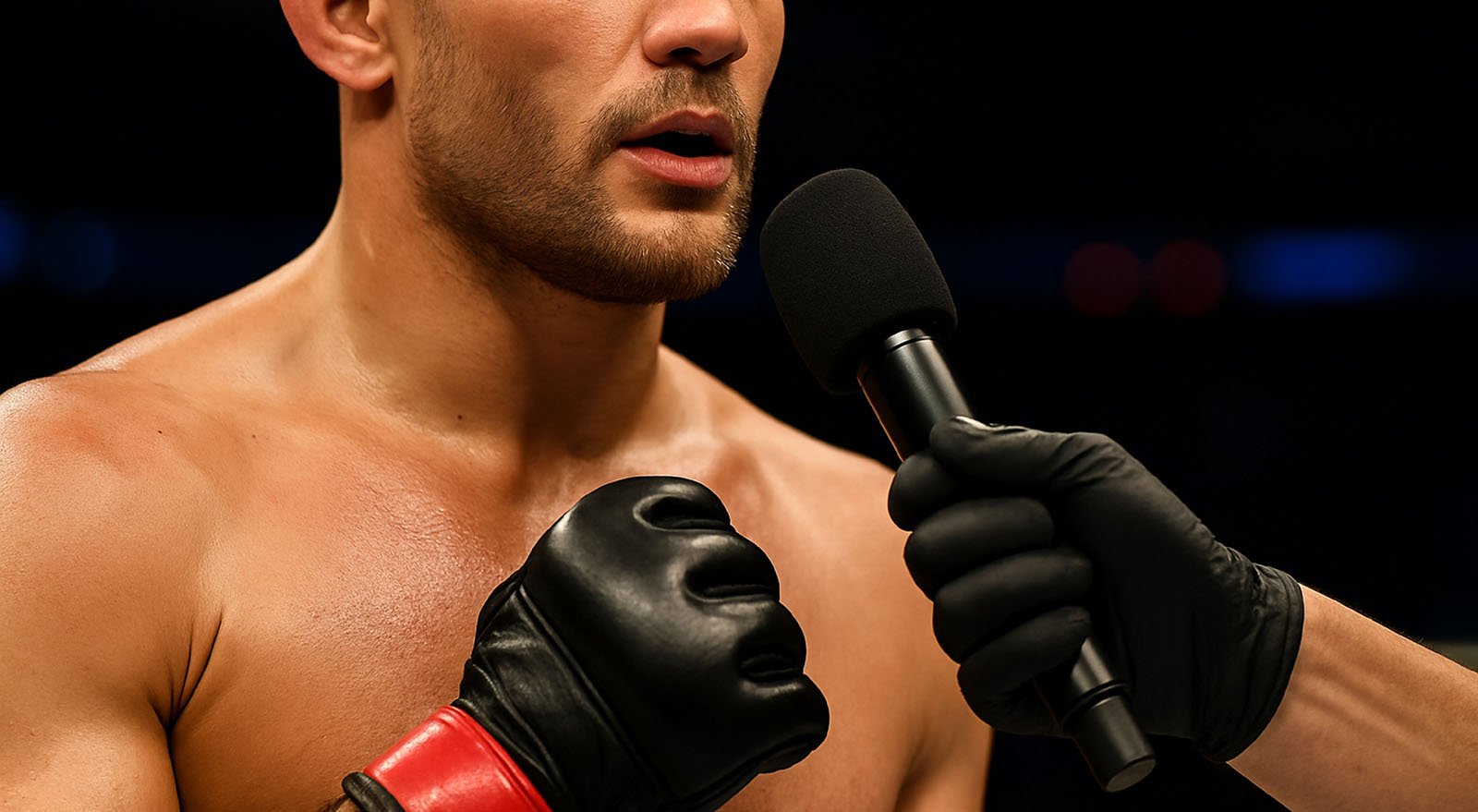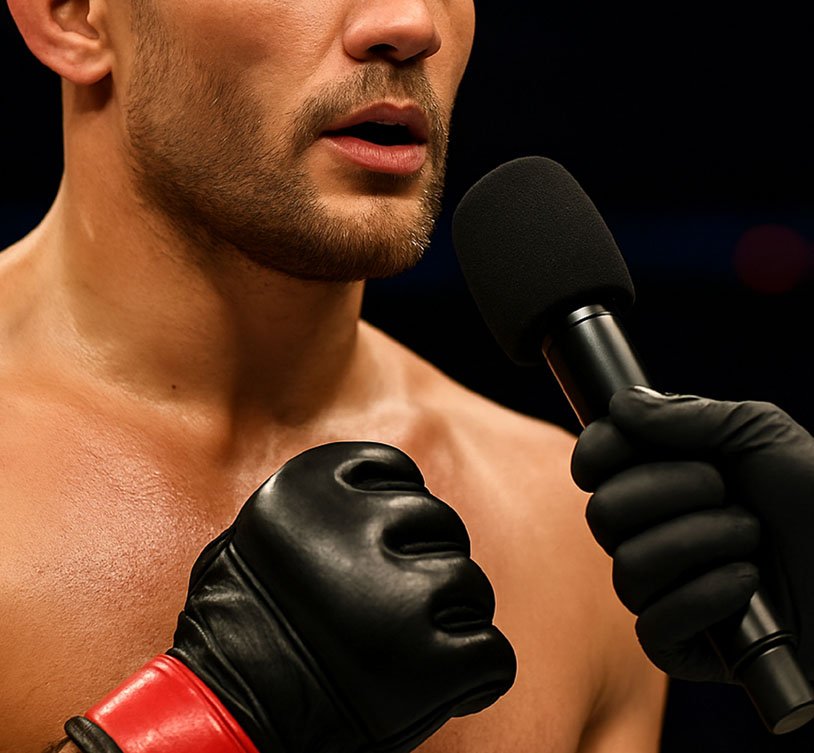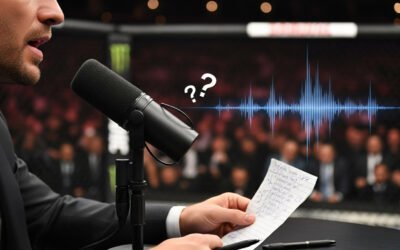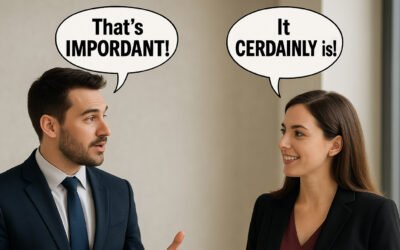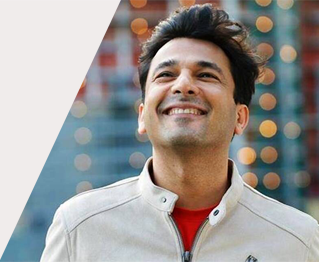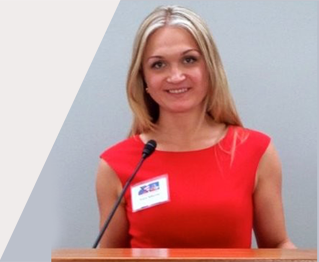How Clear English Impacts an Athlete’s Career in Combat Sports and Beyond
Picture itː You’re an MMA fighter. It’s a UFC Pay-Per-View event on ESPN+, and you’re featured in the main event. You feel pumped; you’ve prepared for months in a really tight fight camp. The fight starts—within one minute you deliver a spectacular spinning back elbow. BOOMǃ Highlight reel stuff. Bruce Buffer shouts, “And the winner by KNOCK OUT…[Insert Your Name Hereǃ] This is itǃǃ And now for your post-fight interview with the incomparable Joe Rogan. Here comes the microphone—it’s your chance to stoke the audience’s fire and win fans for life. But the question is in English – YIKES! You didn’t prepare for this part. You studied some English in school, but you don’t feel confident that you’ll fully understand. So you wait for an interpreter dressed in a formal suit to repeat the question in your native language. Then you respond back – with feeling and intention – but the audience doesn’t understand. The interpreter captures most of what you said but he delivers it in a much more subdued way, as he is not you. But by now, the crowd has checked out. Some of them check their text messages. Others aggressively shout “USA, USA!” And you think to yourself, “What just happened to my big moment of fameǃ?”
When an interview falls flat due to language barriers in professional sports, there’s more at stake than just lost words. What’s really on the line? A lot. Endorsement dollars, media moments, and that viral soundbite that skyrockets a career. English fluency impacts athlete sponsorships directly. This means MMA fighters speaking English fluently have a huge media advantage over those who are not. And I’m here to level the playing field. (And yes, I also help native English-speaking athletes overcome barriers to clear, confident communication.)
I’m Melanie Fox—speech coach, presentation trainer, accent reduction specialist for English (ESL) and Spanish, and your favorite glitter-loving linguist—I empower stars of sport, stage, screen, and social media, so they know how to speak English confidently on camera and in interviews. I help international athletes go from subtitled and subdued to spotlighted and sensational. Because whether you’re in the cage, on the tennis court, or charging the soccer (or football) field, your voice is part of your brand. And when athletes speak clearly, confidently, and authentically in English, the ROI is real.
Why Language Matters in Sports PR
Media isn’t just about answering questions—it’s about commanding the mic. Clear communication counts in sports PR just as it does for any public figure. In the UFC and other high-profile sports, a language barrier can cause:
- Flat crowd reactions during post-fight speeches
- Clumsy interview flow with interpreter back-and-forth
- Misunderstood messaging, leaving sponsors wary
- Missed endorsement opportunities that go to more media-savvy athletes
And even
- Being passed over for PPV fights in favor of more “charismatic” athletes with a stronger following
Take Magomed Ankalaev, for instance. Despite being on an undefeated streak that made him one of the most dominant fighters in the light heavyweight division, it took this Dagestani nine fights in the UFC before being granted a title shot. By comparison, many light heavyweights historically earned title opportunities after five to six wins. As Daniel Cormier noted on the podcast *Good Guy / Bad Guy*, Ankalaev essentially had to “clean out the division” because UFC leadership wasn’t convinced he could “carry a Pay-Per-View.” His reserved personality and language barrier (as Ankalaev does not speak fluent English) made it harder to promote him as a headliner—even though his fighting record spoke volumes.
And then there are the cringe-worthy moments that come from good intentions lost in internal translation. After a recent win, Angolan-born Portuguese fighter Manel Kape told a reporter during a post-fight interview, “I wanted to pleasure myself.” While it was clear he meant something more like “enjoy myself,” the English phrasing had an unintended—and awkward—sexual connotation. Luckily for Kape, the moment passed without major consequence, but the impact remains: missed opportunities to rule the mic the same way you dominate the Octagon.
Even fluent fighters can struggle with pacing, pronunciation, what to say, or interview nerves—especially under the bright lights and a ton of broadcast pressure. A little coaching can go a long way. MMA fighters and public speaking do not have to stand on opposite sides of the cage.
English Fluency = Sponsorship Power
Let’s be real: English is the lingua franca of sports media. Athlete sponsorship and English communication go hand in hand. The more skillfully athletes communicate in it, the more they connect with global audiences. That connection = followers. Followers = visibility. Visibility = endorsements, partnerships, and press.
Here’s what athletes gain when they speak English confidently and clearly:
- Stronger brand deals—because companies want ambassadors who represent them well
- More engaging interviews, fewer awkward translator pauses
- Direct connection with fans, especially in press conferences and social media
- A better shot at being the face of the sport, not just a participant in it
Let’s contrast the Magomed Ankalaev example with that of Chael Sonnen. Sonnen’s sharp tongue and dramatic flair turned him into a media phenomenon. Before facing Anderson Silva, Sonnen had a record of 4–1 in the UFC, yet his brash style and wild callouts helped secure a title shot. Later, despite losing to Silva, he went on to fight Jon Jones for another title—after just one win in a different weight class. While Sonnen never held a UFC belt, he parlayed his masterful mic skills to land him a spot as a coach on *The Ultimate Fighter* (twice), and later as co-host of *Good Guy / Bad Guy*. Love him or hate him, Sonnen showed that charisma and clarity on the mic can be just as powerful as a win streak. And it continues to earn him fame and income well after his retirement as an athlete from the sport.
This Isn’t Just About MMA
While this blog focuses on the UFC, MMA is just one part of the story. The same principles apply across all sports, where the mic is almost as important as the match:
- Baseball players stepping up to the mic with confidence
- NBA and WNBA players seeking global fan bases
- Soccer stars prepping for international media
- Hockey pros with thick accents or stage fright
- Tennis players navigating post-match commentary
- Football players aiming to shine beyond the field
- Olympic hopefuls ready to represent their country—and themselves—on camera
But Don’t Mistake Mastering Fluency for Losing Your Unique Voice
Let’s get one thing cleared up: I don’t coach athletes to “soften” their identity…quite the opposite. Clear language empowers speakers to enhance their message, it should not be an authenticity dampener. I help my clients to remove the obstacles that English speech poses for them—so they can show up as their most powerful, authentic selves. In their own words, with their own flavor, and focused on delivering the message they want the world to hear—while making sure that English doesn’t act as a barrier.
UFC fans would find it hard to overlook dynamic fan-favorite Derrick Lewis, a native of Louisiana. When Joe Rogan asked him why he took his shorts off in the cage, Lewis famously responded, “My balls was hot!” While not in traditional academic English grammar (and perhaps because of this), the vernacular line instantly went viral and cemented Lewis as a media magnet. During his next fight, the cameras panned the crowd, where many of his fans wore his famous words on a T-shirt. While I wasn’t in the crowd, I won’t deny that I own one such T-shirt. (Okay, you got me, I might own three different versions of it.) Derrick Lewis’s use of vernacular speech didn’t hold him back—instead, it humanized him, brought the crowd closer, and helped his brand soar.
We don’t chase perfection—we build confidence.
We don’t cramp individuality—we amplify voices.
When fear subsides, charisma kicks in. Confidence snowballs. That meek, disengaged fighter becomes fearless, fierce, and fun—with the crowd and camera eating it up.
Final Word from the Corner
If you’re a talent agent, manager, coach, or athlete reading this, here’s your reminder: the fight doesn’t start and end when the bell rings. The mic matters, too. Sports media and language perception are inseparable entities, whether an athlete is naturally gifted in this area or not.
Now, don’t get me wrong—interpreters are talented and essential professionals. Your fighter may very well rely on one during a transition period to ensure full comprehension of the questions. But also, do get me right— the athlete should absolutely strive to lend their own voice to the moment. From their heart, to their mind, to their mouth—and directly to the audience’s ears.
Whether it’s through one-on-one coaching, training sessions, or media consulting, I help athletes speak with clarity, confidence, and authentic charisma—so their voice hits as hard as their performance.
And if you’re in the UFC, other MMA organization, or other sector of the wide world of sports… this coach wants in. While my English media coaching for athletes won’t help improve your sports game, it will improve your impact game (and your money game).
Let’s make English your next secret weapon!
ATHLETES AND TRUSTED ADVISORS: Learn more or Contact Melanie






